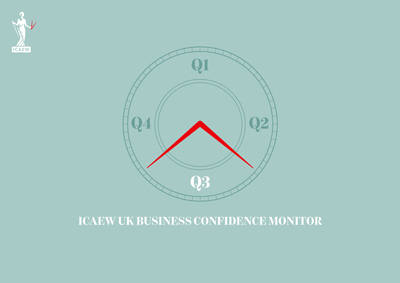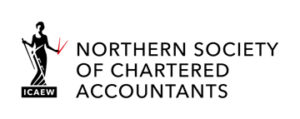EGM called by Northern Society of Chartered Accountants
19 September 2023
Notice is given that the...
The latest Business Confidence Monitor (BCM) shows business confidence falling into negative territory across the UK, as companies face a cost of doing business crisis, alongside the cost of living crisis that consumers are facing.
 The results are based on telephone interviews with ICAEW Chartered Accountants that took place between 25 April and 15 July 2022.
The results are based on telephone interviews with ICAEW Chartered Accountants that took place between 25 April and 15 July 2022.
The Business Confidence Index has been declining since Q1 2022 and has now fallen into negative territory. While the reading of -1.2 in Q3 2022 is better than the UK average, this marks the first negative reading in the region since the peak of the pandemic in 2020.
Domestic sales increased strongly, by 7.2%, in the 12 months to Q3 2022. This is the fastest rate of growth in Northern England since the survey began, with only businesses in the South West achieving a bigger increase in Q3 2022. However, the outlook for the next 12 months is more subdued, with businesses anticipating growth of 3.1%. This is the weakest outlook across all of the UK. Exports are also performing well by historical standards. After increasing by 3.7 year-on-year in Q3 2022, businesses in the region anticipate a 4.2% rise in exports over the next 12 months.
Although businesses are experiencing strong growth in sales, an unprecedented rise in cost pressures helps to explain why the Business Confidence Index has fallen away in Q3 2022. Annual input price inflation now stands at 4.6%, making it the joint highest rate in the region (along with Q1 2022) since the survey began in 2004. The rises reflect current disruptions to supply chains and to global energy markets. Companies clearly expect these to continue, and they forecast that input costs will rise a further 4.8% in the year ahead.
In response to these cost pressures, businesses are also increasing their selling prices charged to customers. These were up 2.2% compared to a year ago, a rate well above the historical average of the last decade. A further 3.1% rise is expected in the next 12 months. The net effect on profits of this combination of higher prices, costs and sales has, so far, been positive. Growth in profits reached 6.9% in the year to Q3 2022, the fastest rate since early 2015. But in the year ahead businesses expect the pace of growth to slow to 3.2%, as domestic sales growth softens and costs rise further.
In addition to rising input prices, businesses are being strained by higher labour costs. Average total wage growth reached 3.3% in Q3 2022, the highest in the region since Q1 2008. The outlook of 2.9% for the next 12 months remains elevated compared to the historical average for the region. In contrast, employment growth lags the rest of the UK, except for Yorkshire and Humberside. After increasing staff levels by 1.7% in the 12 months to Q3 2022, businesses plan a 2.0% rise over the next 12 months which is also weak when compared to the rest of the UK.
Rising wage costs are partly explained by recruitment difficulties, with post-Brexit limits on hiring workers from the EU and people withdrawing from the labour market following the pandemic both contributing factors. The proportion of businesses reporting staff turnover as a growing challenge is 53%. This is over three times the historical average for the region and the highest since the survey began in 2004. Only Wales has a higher percentage of companies citing the issue. Largely as a result, the share of businesses struggling with the availability of non-management skills is, at 44%, very high compared with historical norms. These labour market challenges may make it harder for companies to meet sales opportunities in the year ahead.
Adding to the picture, transport problems continue to trend upwards and have reached 35%, the highest proportion for the region since the survey began. This may reflect the continued shortage of HGV drivers, as well as port delays due to Brexit. The tax burden is a growing issue, and at 25% is at its highest rate in a decade. And 43% of companies report regulatory requirements as a pressing issue, which is greater than any other nation and region apart from Scotland.
Although investment rates have improved since the height of the pandemic, growth in spending has fallen behind other regions. Expansion in both capital investment and Research & Development (R&D) budgets lag the national averages at 2.6% and 0.8% respectively. The latter is slower than in any other region. Businesses in the North also have the weakest capital investment plans over the next 12 months (0.7%). But more positively, they expect to match the national average growth (1.8%) for R&D spending.
Find out more about the ICAEW UK Business Confidence Monitor at icaew.com/bcm
 Northern Society of Chartered Accountants (NorSCA) represents 4,000 ICAEW members and ACA students working in business and the finance profession across the North East of England, Teesside, northern Yorkshire and Cumbria.
Northern Society of Chartered Accountants (NorSCA) represents 4,000 ICAEW members and ACA students working in business and the finance profession across the North East of England, Teesside, northern Yorkshire and Cumbria.
We have been assisting businesses in the north of England and producing chartered accountants for over 140 years.
 There are more than 1.8m chartered accountants and students around the world and 189,500 of them are members and students of ICAEW. They are talented, ethical and committed professionals, which is why all of the top 100 Global Brands employ chartered accountants.*
There are more than 1.8m chartered accountants and students around the world and 189,500 of them are members and students of ICAEW. They are talented, ethical and committed professionals, which is why all of the top 100 Global Brands employ chartered accountants.*
ICAEW promotes inclusivity, diversity and fairness. We attract talented individuals into the profession and give them the skills and values they need to build resilient businesses, economies and societies, while ensuring our planet’s resources are managed sustainably.
We’ve been at the heart of the accountancy profession since we were founded in 1880 to ensure trust in business. We share our knowledge and insight with governments, regulators and business leaders worldwide as we believe accountancy is a force for positive economic change across the world.
We believe that chartered accountancy can be a force for positive change. By sharing our insight, expertise and understanding we can help to create strong economies and a sustainable future for all.
Founded in 1880, we have a long history of serving the public interest and we continue to work with governments, regulators and business leaders around the world. And, as an improvement regulator, we supervise and monitor over 12,000 firms, holding them, and all ICAEW members and students, to the highest standards of professional competency and conduct.
ICAEW is proud to be part of Chartered Accountants Worldwide, a global network of 750,000 members across 190 countries, which promotes the expertise and skills of chartered accountants on a global basis.
ICAEW (Institute of Chartered Accountants in England and Wales) is a founder member of Chartered Accountants Worldwide and the Global Accounting Alliance.
*CAW, 2020 – Interbrand, Best Global Brands 2019
Share this article...
Tweet